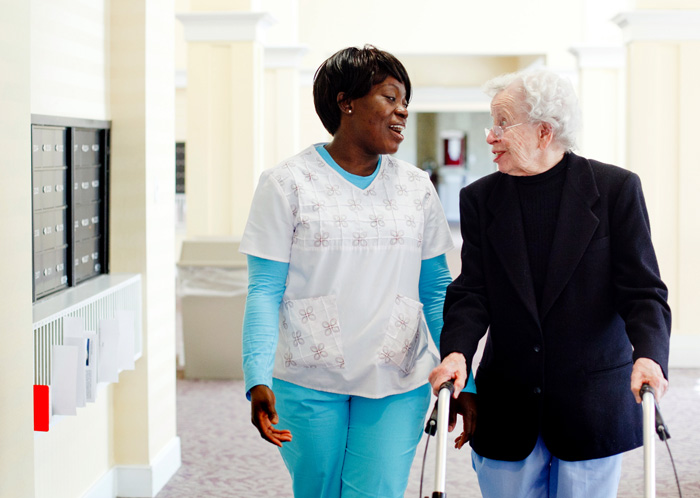Improving quality of care and quality of life for the nation’s 1.4 million nursing home residents remains an urgent priority for policy makers and providers alike.
It is also a priority for the LeadingAge LTSS Center @UMass Boston. Our researchers are working on a variety of initiatives aimed at helping providers, regulators, and policy makers ensure that nursing homes provide the highest quality of care possible.
The LTSS Center distinguished itself in 2017 by releasing the findings of a ground-breaking evaluation of the Kansas PEAK 2.0 Program, which showed that residents who live in nursing homes implementing culture change can expect to experience reductions in depressive symptoms, antipsychotic drug use, pressure ulcers, incontinent episodes, catheter use, and urinary tract infections.

Read more about our work on nursing home quality:
The Geriatric Substance Abuse Recovery Program (GSARP) provides substance abuse counseling to older adults who come to The New Jewish Home in New York for post-acute care after a hospital stay. A 2016 study showed that the 3-year-old GSARP is effective in helping participants address their substance abuse issues.
During a new 18-month study, supported by a grant from the Catherine Weldon Donaghue Medical Research Foundation, researchers at the LeadingAge LTSS Center @UMass Boston will explore whether GSARP might also improve rehabilitation outcomes for program participants. Researchers will also identify the characteristics and health behaviors of GSARP participants who are most likely to experience successful post-acute care outcomes, most likely to participate in the GSARP program, and most likely to refuse participation.
In addition to sharing study findings, researchers plan to develop a manual that would help other nursing homes establish similar substance abuse recovery programs in their own post-acute settings.
Status: Ongoing
Contact: Verena Cimarolli
Read More:
The LeadingAge LTSS Center @UMass Boston evaluated a Medicaid pay-for-performance incentive program designed to facilitate the adoption of culture change in 340 Kansas nursing homes.
Researchers examined whether the Promoting Excellent Alternatives in Kansas (PEAK 2.0) incentive program improves resident health, quality of life, and satisfaction with their nursing homes, and employee job satisfaction. Researchers also assessed the educational and evaluation components of the PEAK 2.0 program.
The study, funded by the Retirement Research Foundation, was conducted in collaboration with the Kansas State University Center on Aging. An Issue Brief with project findings is forthcoming.
Status: Completed
Contact: Robyn Stone
Read More:
New Research Project Will Evaluate Potential Benefits of Culture Change
What’s So Great about Culture Change? Study Offers Some Clues
Medicaid Incentives Spread Person-Centered Care to Unlikely Adopters
Person-Centered Care Increases Satisfaction Among Nursing Home Residents
The LeadingAge LTSS Center @UMass Boston partnered with the Francis E. Parker Memorial Home to assess the effects of person-centered care on nursing home residents. Parker, a LeadingAge member in Piscataway, NJ, funded the study.
The study was designed to test whether older adults with depression and/or dementia experience better outcomes when they live in nursing homes that implement person-centered care and follow a “household model.”
Status: Completed
Contact: Robyn Stone, Natasha Bryant
Read More:
Does Person-Centered Care Improve Outcomes for Residents with Depression and Dementia?
Rutgers Students Learn Life Lessons at Parker Home
New Publication Provides Snapshot of Culture Change Research
Documenting the Benefits of Comprehensive Culture Change PDF
Due to unequal payment incentives and recent policy innovations, nursing homes face increased pressure to specialize in post-acute care for Medicare beneficiaries.
However, it remains unclear whether the heightened attention on post-acute care leads to declines in care provided to long-stay residents.
The Donaghue Foundation is supporting this study to examine the effect of increased Medicare census on long-stay quality.
Status: Ongoing
Contact: Jennifer Hefele
This pilot study, funded by the Gerontology Institute at UMass Boston, is investigating psychological and social processes that may promote or hinder the effective implementation of Medical Orders for Life-sustaining Treatment (MOLST).
Study participants include nursing home administrators, nurse managers, social workers, certified nursing assistants, chaplains, and other clinical or administrative staff that implement the MOLST.
Status: Ongoing
Contact: Kathrin Boerner
Read More:
The Donaghue Foundation is supporting this study to examine whether nursing home quality is a good predictor of satisfaction among residents and their families.
Researchers will measure the correlation between quality data and satisfaction survey results at individual nursing homes.
Status: Ongoing
Contact: Pamela Nadash
Read More:
Study Tracks Gap Between Nursing Home Satisfaction Ratings and Quality Data
The Community-based Nursing Home (CNH) Dashboard was developed to compare quality of care provided in nursing homes where the U.S. Department of Veterans Affairs (VA) purchases care, and other nursing homes in the local market.
The dashboard will help VA manage the program quality of CNH’s more effectively and support the agency’s goal to improve the quality of care that veterans receive. This project is supported by the VA Office of Geriatrics and Extended Care.
Status: Ongoing
Contact: Edward Miller
Other Areas of Work
WORKFORCE
Exploring strategies for strengthening the LTSS workforce
HOUSING PLUS SERVICES
Assessing the role of housing plus services models in affordable senior housing communities
FINANCING
Finding new approaches to financing long-term services and supports
AGING & HEALTH
Building a robust evidence base for healthy aging
CONSUMER ENGAGEMENT
Engaging older adults in our work, and encouraging other LTSS organizations to do the same
NURSING HOMES
Identifying evidence-based practices to enhance nursing home quality
